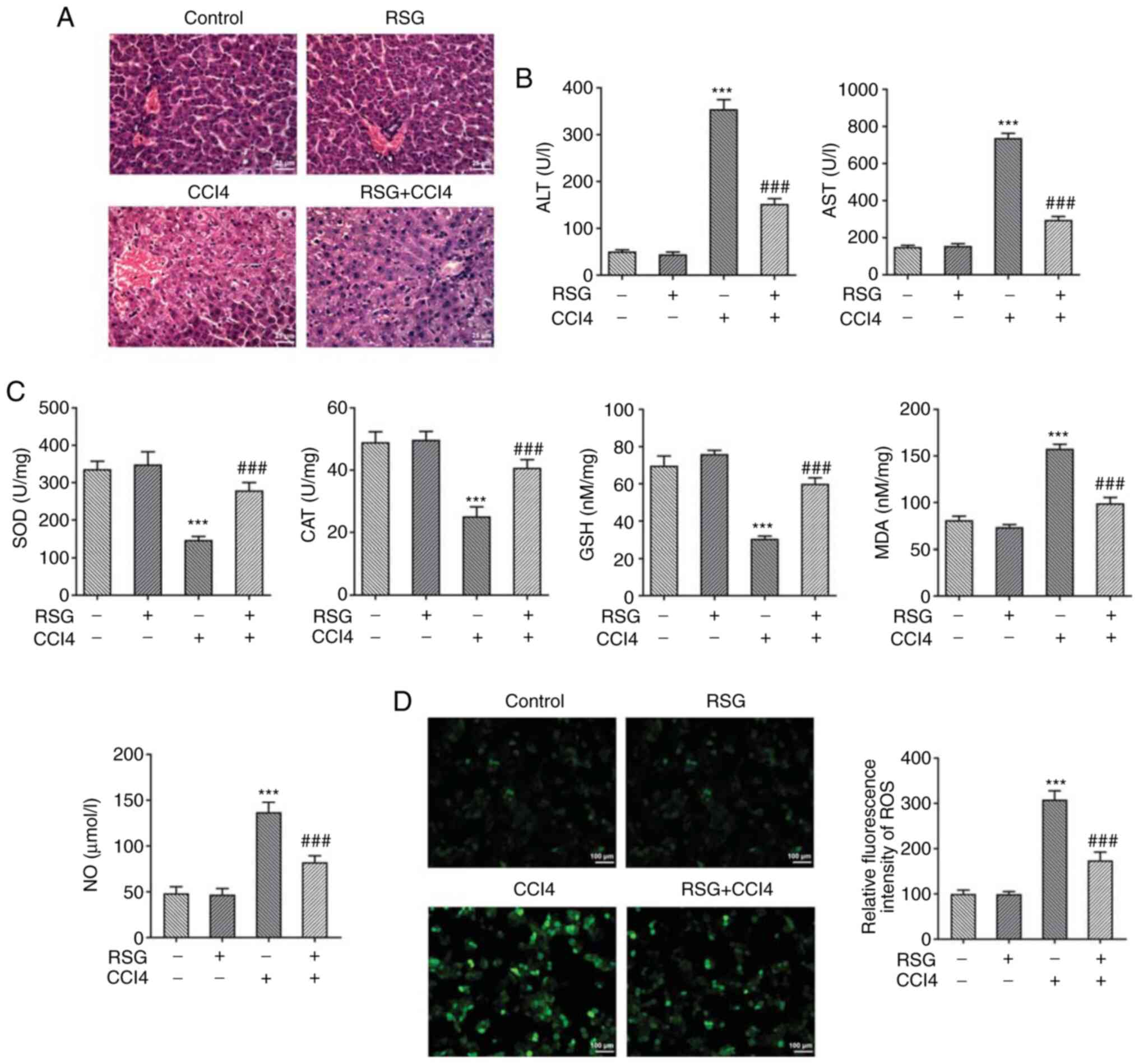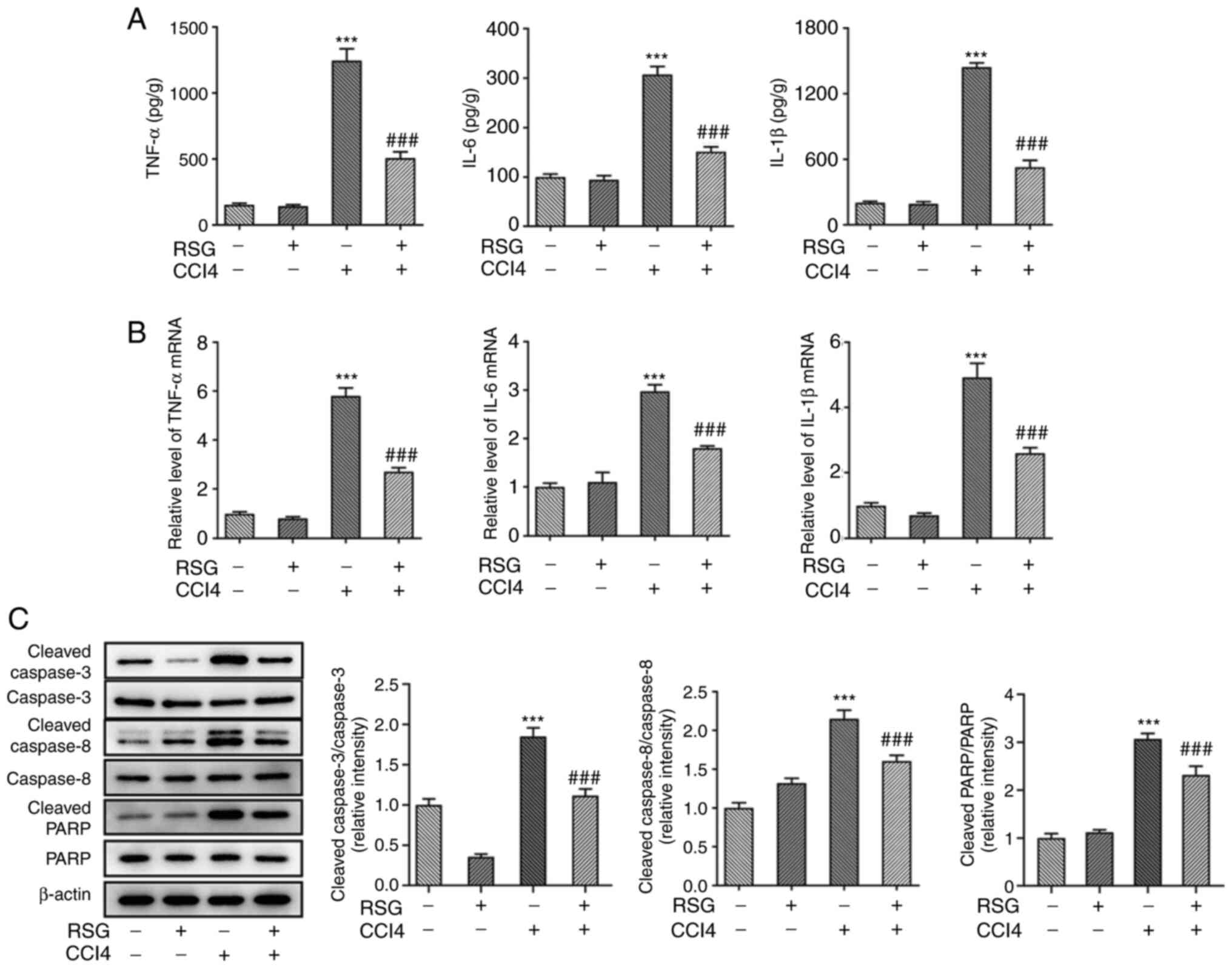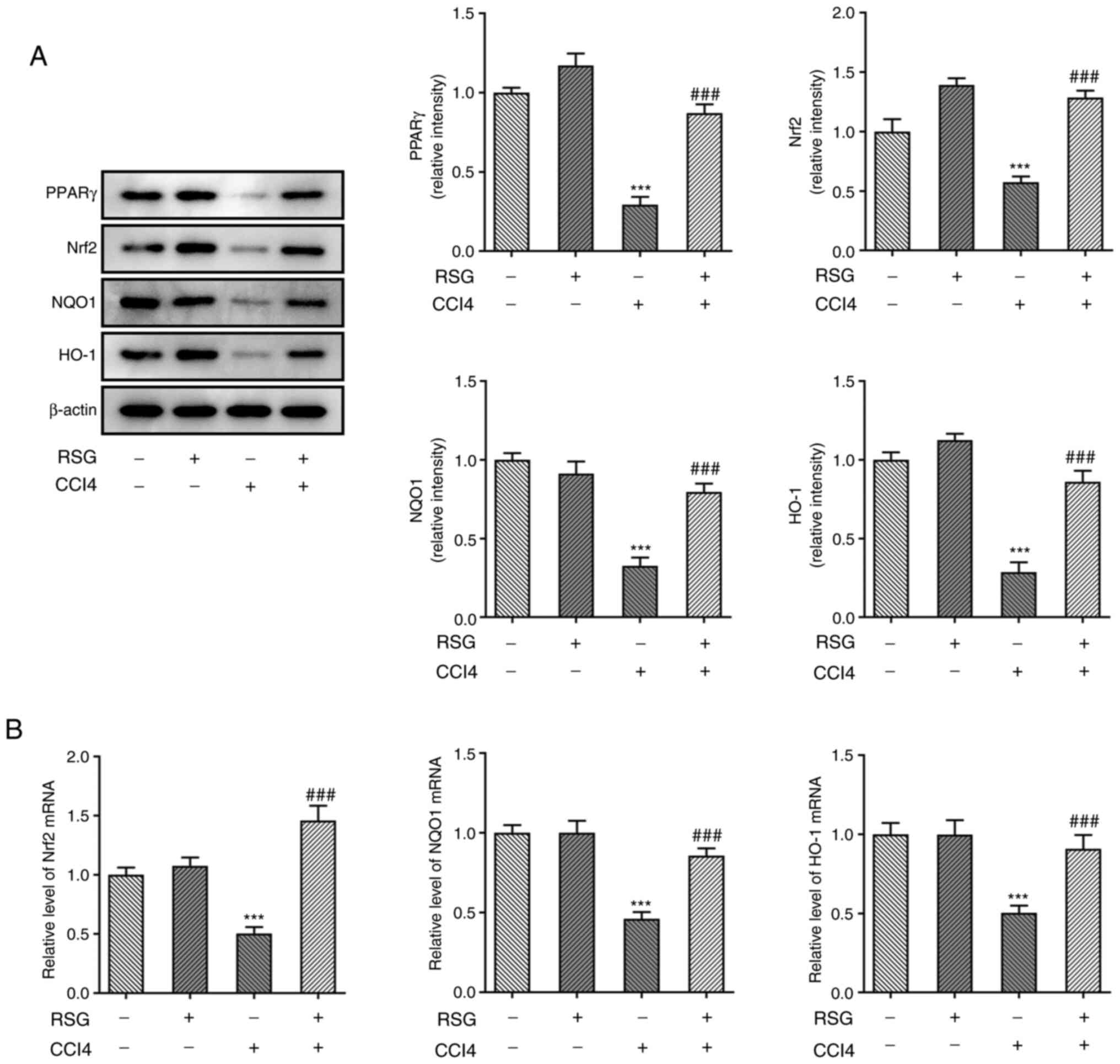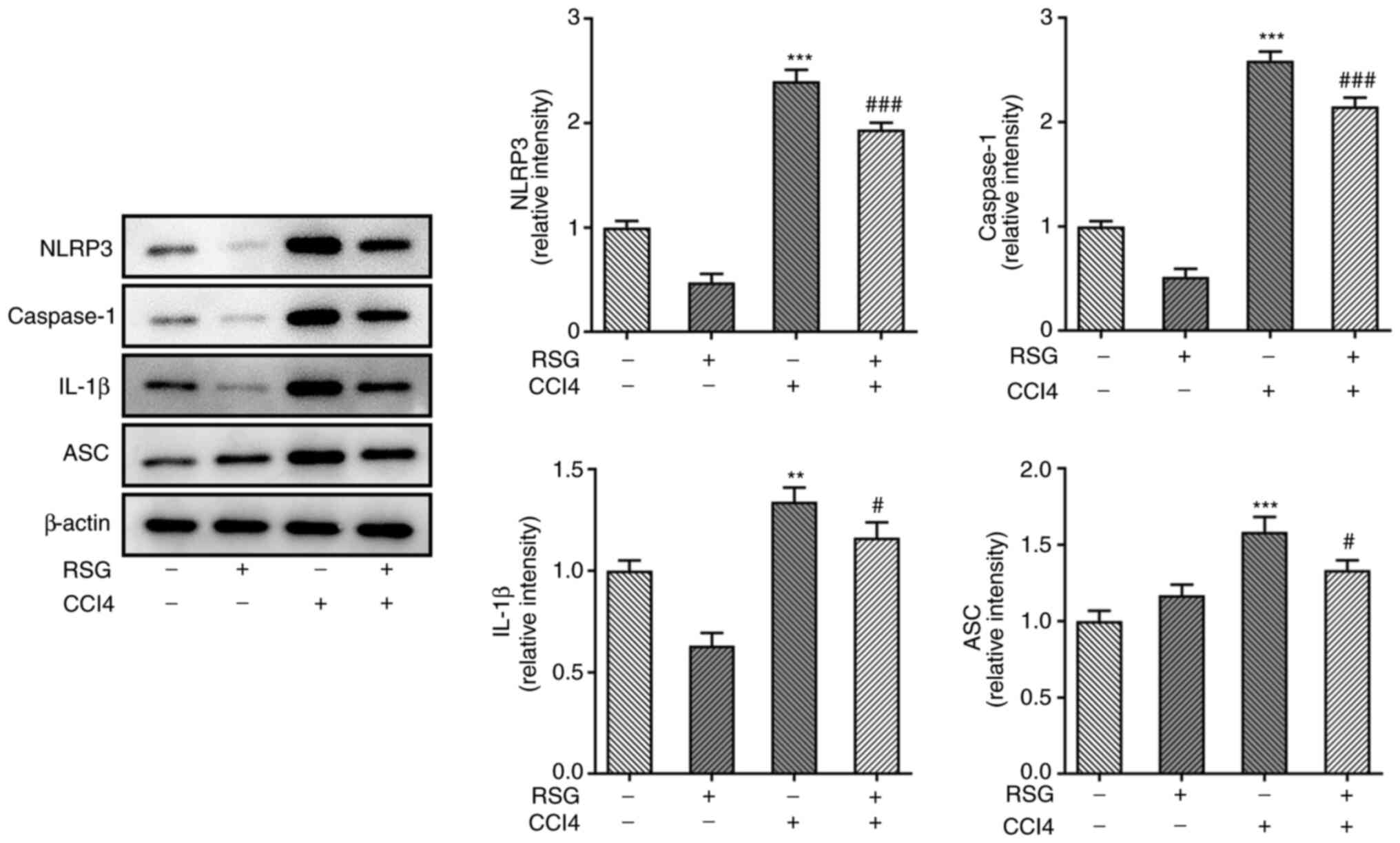|
1
|
Coccolini F, Coimbra R, Ordonez C, Kluger
Y, Vega F, Moore EE, Biffl W, Peitzman A, Horer T, Abu-Zidan FM, et
al: Liver trauma: WSES 2020 guidelines. World J Emerg Surg.
15(24)2020.PubMed/NCBI View Article : Google Scholar
|
|
2
|
Zou Y, Xiong JB, Ma K, Wang AZ and Qian
KJ: Rac2 deficiency attenuates CCl4-induced liver injury
through suppressing inflammation and oxidative stress. Biomed
Pharmacother. 94:140–149. 2017.PubMed/NCBI View Article : Google Scholar
|
|
3
|
Zhang X, Kuang G, Wan J, Jiang R, Ma L,
Gong X and Liu X: Salidroside protects mice against CCl4-induced
acute liver injury via down-regulating CYP2E1 expression and
inhibiting NLRP3 inflammasome activation. Int Immunopharmacol.
85(106662)2020.PubMed/NCBI View Article : Google Scholar
|
|
4
|
Cichoż-Lach H and Michalak A: Oxidative
stress as a crucial factor in liver diseases. World J
Gastroenterol. 20:8082–8091. 2014.PubMed/NCBI View Article : Google Scholar
|
|
5
|
Li S, Tan HY, Wang N, Zhang ZJ, Lao L,
Wong CW and Feng Y: The role of oxidative stress and antioxidants
in liver diseases. Int J Mol Sci. 16:26087–26124. 2015.PubMed/NCBI View Article : Google Scholar
|
|
6
|
Cong M, Zhao W, Liu T, Wang P, Fan X, Zhai
Q, Bao X, Zhang D, You H, Kisseleva T, et al: Protective effect of
human serum amyloid P on CCl4-induced acute liver injury in mice.
Int J Mol Med. 40:454–464. 2017.PubMed/NCBI View Article : Google Scholar
|
|
7
|
Tsai TH, Tam K, Chen SF, Liou JY, Tsai YC,
Lee YM, Huang TY and Shyue SK: Deletion of caveolin-1 attenuates
LPS/GalN-induced acute liver injury in mice. J Cell Mol Med.
22:5573–5582. 2018.PubMed/NCBI View Article : Google Scholar
|
|
8
|
Stage TB, Christensen MH, Jørgensen NR,
Beck-Nielsen H, Brøsen K, Gram J and Frost M: Effects of metformin,
rosiglitazone and insulin on bone metabolism in patients with type
2 diabetes. Bone. 112:35–41. 2018.PubMed/NCBI View Article : Google Scholar
|
|
9
|
Li J, Xue YM, Zhu B, Pan YH, Zhang Y, Wang
C and Li Y: Rosiglitazone Elicits an Adiponectin-Mediated
Insulin-Sensitizing Action at the Adipose Tissue-Liver Axis in
Otsuka Long-Evans Tokushima Fatty Rats. J Diabetes Res.
2018(4627842)2018.PubMed/NCBI View Article : Google Scholar
|
|
10
|
Ahn KO, Lim SW, Yang HJ, Li C, Sugawara A,
Ito S, Choi BS, Kim YS, Kim J and Yang CW: Induction of PPAR gamma
mRNA and protein expression by rosiglitazone in chronic
cyclosporine nephropathy in the rat. Yonsei Med J. 48:308–316.
2007.PubMed/NCBI View Article : Google Scholar
|
|
11
|
Yu X, Shao XG, Sun H, Li YN, Yang J, Deng
YC and Huang YG: Activation of cerebral peroxisome
proliferator-activated receptors gamma exerts neuroprotection by
inhibiting oxidative stress following pilocarpine-induced status
epilepticus. Brain Res. 1200:146–158. 2008.PubMed/NCBI View Article : Google Scholar
|
|
12
|
Gong P, Stewart D, Hu B, Li N, Cook J, Nel
A and Alam J: Activation of the mouse heme oxygenase-1 gene by
15-deoxy-Delta(12,14)-prostaglandin J(2) is mediated by the stress
response elements and transcription factor Nrf2. Antioxid Redox
Signal. 4:249–257. 2002.PubMed/NCBI View Article : Google Scholar
|
|
13
|
Wang X, Wang Z, Liu JZ, Hu JX, Chen HL, Li
WL and Hai CX: Double antioxidant activities of rosiglitazone
against high glucose-induced oxidative stress in hepatocyte.
Toxicol In Vitro. 25:839–847. 2011.PubMed/NCBI View Article : Google Scholar
|
|
14
|
Ravan AP, Bahmani M, Ghasemi Basir HR,
Salehi I and Oshaghi EA: Hepatoprotective effects of Vaccinium
arctostaphylos against CCl4-induced acute liver injury in rats. J
Basic Clin Physiol Pharmacol. 28:463–471. 2017.PubMed/NCBI View Article : Google Scholar
|
|
15
|
National Research Council of the National
Academies: Guide for the Care and Use of Laboratory Animals. 8th
edition. The National Academies Press, Washington, DC, 2011.
|
|
16
|
Livak KJ and Schmittgen TD: Analysis of
relative gene expression data using real-time quantitative PCR and
the 2(-Delta Delta C(T)) Method. Methods. 25:402–408.
2001.PubMed/NCBI View Article : Google Scholar
|
|
17
|
Farzanegi P, Dana A, Ebrahimpoor Z, Asadi
M and Azarbayjani MA: Mechanisms of beneficial effects of exercise
training on non-alcoholic fatty liver disease (NAFLD): Roles of
oxidative stress and inflammation. Eur J Sport Sci. 19:994–1003.
2019.PubMed/NCBI View Article : Google Scholar
|
|
18
|
Wei PC, Chang AN, Kao J, Du Z, Meyers RM,
Alt FW and Schwer B: Long Neural Genes Harbor Recurrent DNA Break
Clusters in Neural Stem/Progenitor Cells. Cell. 164:644–655.
2016.PubMed/NCBI View Article : Google Scholar
|
|
19
|
Melchart D, Hager S, Albrecht S, Dai J,
Weidenhammer W and Teschke R: Herbal Traditional Chinese Medicine
and suspected liver injury: A prospective study. World J Hepatol.
9:1141–1157. 2017.PubMed/NCBI View Article : Google Scholar
|
|
20
|
Dormandy TL: Free-radical pathology and
medicine. A review. J R Coll Physicians Lond. 23:221–227.
1989.PubMed/NCBI
|
|
21
|
Popović B, Velimirović M, Stojković T,
Brajović G, De Luka SR, Milovanović I, Stefanović S, Nikolić D,
Ristić-Djurović JL, Petronijević ND and Trbovich AM: The influence
of ageing on the extrapineal melatonin synthetic pathway. Exp
Gerontol. 110:151–157. 2018.PubMed/NCBI View Article : Google Scholar
|
|
22
|
D'Agostino J, Zhang H, Kenaan C and
Hollenberg PF: Mechanism-based inactivation of human cytochrome
P450 2B6 by chlorpyrifos. Chem Res Toxicol. 28:1484–1495.
2015.PubMed/NCBI View Article : Google Scholar
|
|
23
|
Cui X, Gong J, Han H, He L, Teng Y, Tetley
T, Sinharay R, Chung KF, Islam T, Gilliland F, et al: Relationship
between free and total malondialdehyde, a well-established marker
of oxidative stress, in various types of human biospecimens. J
Thorac Dis. 10:3088–3097. 2018.PubMed/NCBI View Article : Google Scholar
|
|
24
|
Ohara M, Ohnishi S, Hosono H, Yamamoto K,
Yuyama K, Nakamura H, Fu Q, Maehara O, Suda G and Sakamoto N:
Extracellular vesicles from amnion-derived mesenchymal stem cells
ameliorate hepatic inflammation and fibrosis in rats. Stem Cells
Int. 2018(3212643)2018.PubMed/NCBI View Article : Google Scholar
|
|
25
|
Chen MF, Huang SJ, Huang CC, Liu PS, Lin
KI, Liu CW, Hsieh WC, Shiu LY and Chen CH: Saikosaponin d induces
cell death through caspase-3-dependent, caspase-3-independent and
mitochondrial pathways in mammalian hepatic stellate cells. BMC
Cancer. 16(532)2016.PubMed/NCBI View Article : Google Scholar
|
|
26
|
Mansouri A, Gattolliat CH and Asselah T:
Mitochondrial dysfunction and signaling in chronic liver diseases.
Gastroenterology. 155:629–647. 2018.PubMed/NCBI View Article : Google Scholar
|
|
27
|
Okoye CN, MacDonald-Jay N and Kamunde C:
Effects of bioenergetics, temperature and cadmium on liver
mitochondria reactive oxygen species production and consumption.
Aquat Toxicol. 214(105264)2019.PubMed/NCBI View Article : Google Scholar
|
|
28
|
Zhu R, Wang Y, Zhang L and Guo Q:
Oxidative stress and liver disease. Hepatol Res. 42:741–749.
2012.PubMed/NCBI View Article : Google Scholar
|
|
29
|
No JH, Kim YB and Song YS: Targeting nrf2
signaling to combat chemoresistance. J Cancer Prev. 19:111–117.
2014.PubMed/NCBI View Article : Google Scholar
|
|
30
|
Bataille AM and Manautou JE: Nrf2: A
potential target for new therapeutics in liver disease. Clin
Pharmacol Ther. 92:340–348. 2012.PubMed/NCBI View Article : Google Scholar
|
|
31
|
Dodson M, de la Vega MR, Cholanians AB,
Schmidlin CJ, Chapman E and Zhang DD: Modulating NRF2 in disease:
Timing is everything. Annu Rev Pharmacol Toxicol. 59:555–575.
2019.PubMed/NCBI View Article : Google Scholar
|
|
32
|
Shin SM, Yang JH and Ki SH: Role of the
Nrf2-ARE pathway in liver diseases. Oxid Med Cell Longev.
2013(763257)2013.PubMed/NCBI View Article : Google Scholar
|
|
33
|
Chan K, Han XD and Kan YW: An important
function of Nrf2 in combating oxidative stress: Detoxification of
acetaminophen. Proc Natl Acad Sci USA. 98:4611–4616.
2001.PubMed/NCBI View Article : Google Scholar
|
|
34
|
Xu Y, Tang Y, Lu J and Zhang W, Zhu Y,
Zhang S, Ma G, Jiang P and Zhang W: PINK1-mediated mitophagy
protects against hepatic ischemia/reperfusion injury by restraining
NLRP3 inflammasome activation. Free Radic Biol Med. 160:871–886.
2020.PubMed/NCBI View Article : Google Scholar
|
|
35
|
Wree A, McGeough MD, Inzaugarat ME, Eguchi
A, Schuster S, Johnson CD, Peña CA, Geisler LJ, Papouchado BG,
Hoffman HM and Feldstein AE: NLRP3 inflammasome driven liver injury
and fibrosis: Roles of IL-17 and TNF in mice. Hepatology.
67:736–749. 2018.PubMed/NCBI View Article : Google Scholar
|
|
36
|
Strowig T, Henao-Mejia J, Elinav E and
Flavell R: Inflammasomes in health and disease. Nature.
481:278–286. 2012.PubMed/NCBI View Article : Google Scholar
|


















